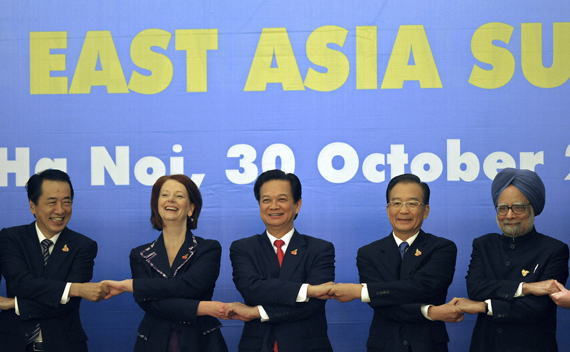Japan Reawakens?
More on:

Over the past year or so, I have been directing a project that brings Japanese and American experts together to discuss how the rise of China and India are affecting the United States and Japan, and if—and how—this shift in global power may alter our alliance agenda. In February, a small CFR team—including my colleagues Elizabeth Economy and Adam Segal—visited Tokyo to meet with Japanese experts from the government, private business, media and academia to hear the range of views in Japan on what exactly this structural shift in world politics means for Japan.
What we heard from every government ministry was an emphasis on the need for Japan to be more “strategic.” More surprising was that we heard similar language from academics, business leaders and media: Japan’s economic goals, its military development, and its diplomacy were no longer to be discrete sets of policymaking, but ought to be defined in terms of the need to cope with a rising China. For those of us used to a more subtly phrased—and less unified—Japanese commentary on its diplomatic challenges, this was a blunt acknowledgement that the confrontation last fall with China had prompted a new consensus in Tokyo that a rising China was going to be difficult for Japan to manage.
I recently participated in another excellent effort to examine the impact of newly rising powers. Organized by Henry Nau and Deepa Ollapally at George Washington University, a daylong conference brought together a tremendous group of regional experts to discuss the “schools of thought” that shape foreign policy choices in China, Japan, India, Russia and Iran. Academics and U.S. policymakers—past and present—explored the implications for U.S. foreign policy.
You can see the entire discussion on C-SPAN. But here are some quick observations from the Japan panel to whet your appetite.
Richard Samuels of MIT and Narushige Michishita of the National Graduate Institute for Policy Studies presented a tremendously rich paper on “Hugging and Hedging” that explores how perceptions of China’s rise and U.S. demise are refining Japan’s strategic debate. I cannot do justice to their full argument here, but the discussion on Japan produced the following:
- Agreement by all panelists that this is a moment of significant change.
- Uncertainty still about whether domestic political change in Japan has brought into power a new foreign policy approach.
- Uncertainty also about whether the Democratic Party of Japan will adjust itself to strategic choices made by its predecessor, the Liberal Democrats.
There was general agreement across the panel that electoral change in Japan opened the possibility for a new conversation in Japan about its strategic options, and a new realization that strategic choices ahead will fundamentally challenge Japan’s past choices of limited armament and strategic dependence on the United States.
Having spent the past year or more in the Obama administration navigating these changes—both within Japan and in the relations among the powers of Northeast Asia—Michael Schiffer, Deputy Assistant Secretary for East Asia in the Office of the Secretary of Defense for Asian and Pacific Security Affairs, reminded all of us outside of government how immensely important it is to effectively analyze this moment of domestic political change in Japan.
The impact of the recent devastation on Japan remained too difficult to discuss in terms of the longer term debate over national strategy. Yet, we were all discussing a Japan that was, well, if not rising, at least potentially on the cusp of transformation and perhaps even rebirth. And that was a refreshing and heartening premise for thinking about Japan’s future.
More on:
 Online Store
Online Store
